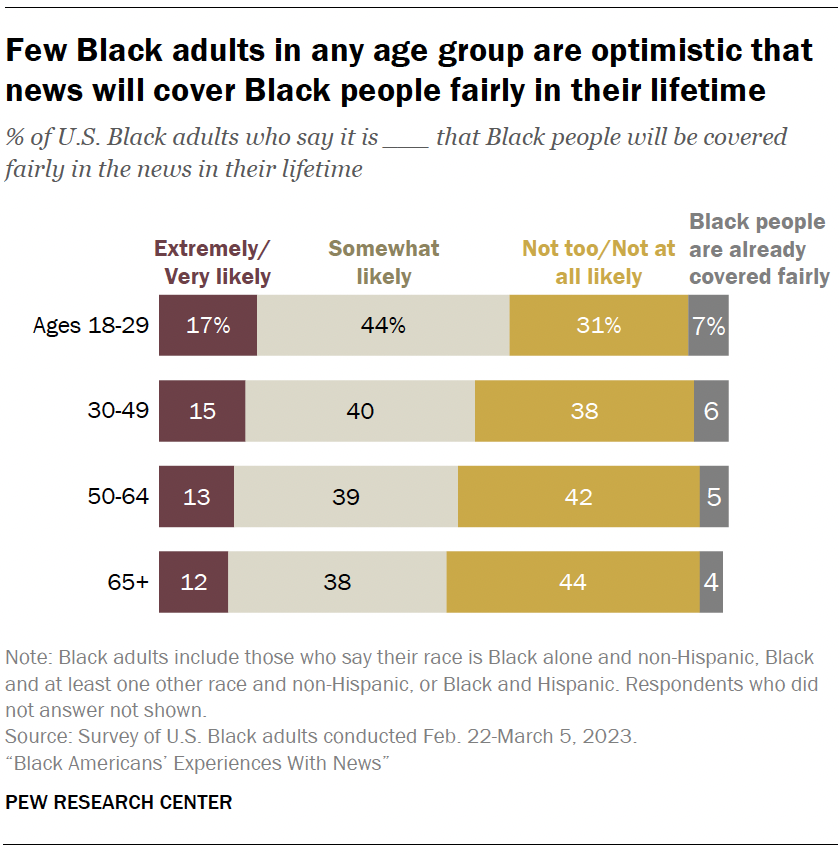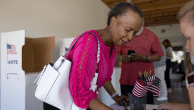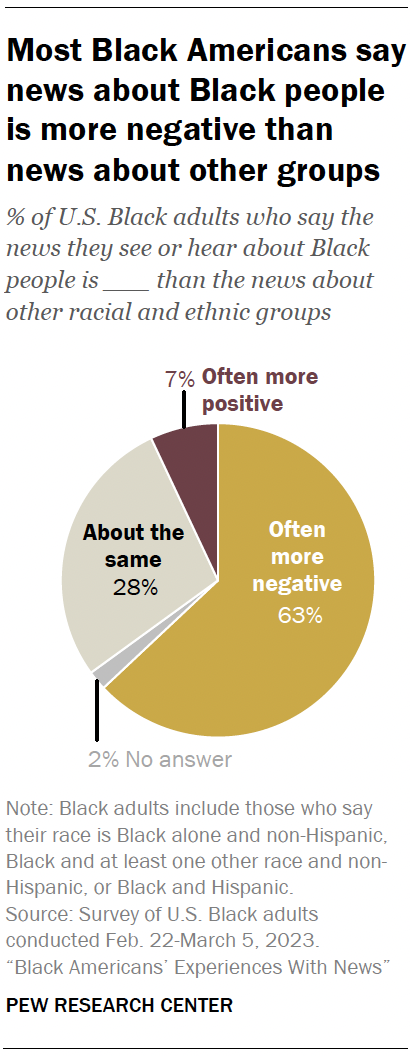
Black Americans express a range of concerns about how Black people are covered in the news.
Our survey asked U.S. Black adults to evaluate several aspects of the news that they see or hear about Black people. In each case, Black Americans are much more likely to offer a negative than positive assessment of news coverage about Black people – but a few areas stand out as particularly negative.
For instance, nearly two-thirds of Black adults (63%) say that the news they see or hear about Black people is often more negative than news about people in other racial and ethnic groups. This is more than twice the share who say Black people are covered about the same as other groups (28%), while just 7% say coverage of Black people is often more positive.
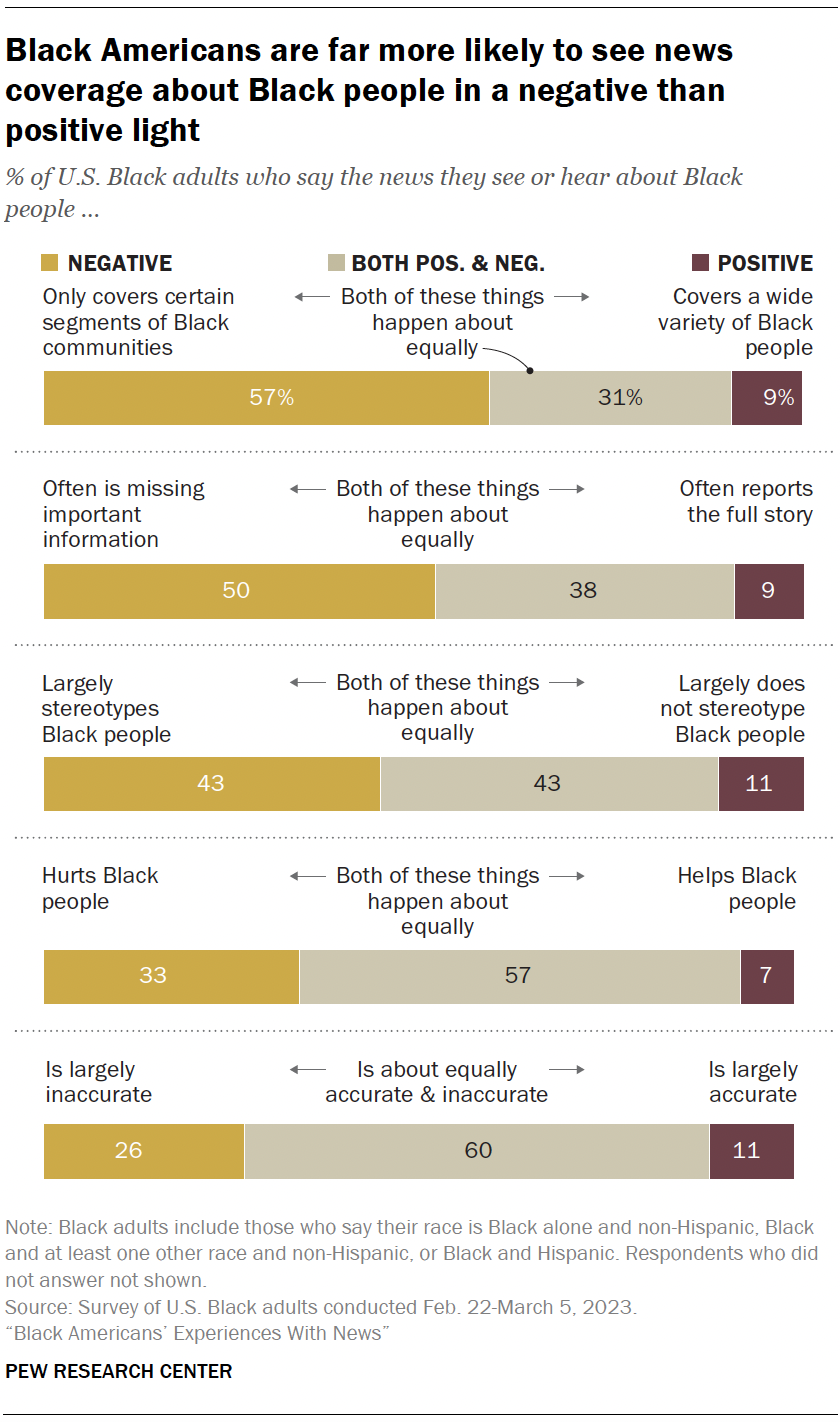
At least half of Black adults say the news they see or hear about Black people only covers certain segments of Black communities (57%) or is often missing important information (50%), substantially more than the 9% each who say that news they see covers a wide variety of Black people and that it often reports the full story. And Black Americans are far more likely to say the news largely stereotypes Black people than to say it largely does not stereotype (43% vs. 11%).
In some cases, majorities offer assessments that are somewhere in the middle. For example, 60% of Black adults say news about Black people is equally accurate and inaccurate, although the share who describe it as largely inaccurate is still more than double the share who say it is mostly accurate (26% vs. 11%).
Quotes from focus groups on problems in news coverage of Black people:
“When a White person commits a crime it’s an individual, it is a mental issue. When a Black person commits a crime it’s the total community. It’s the Black community, and it’s an indictment on all of us.” –Black man, 61
“Whenever they don’t say a race, it’s White. And I think everybody on here knows, that’s been around, pays attention knows that. Any time it’s a Black person they’re going to say, it’s a young Black male or Black male with dreads or whatever like that. But any time it’s not a Black person, they’re going to say it was a suspect in his 50s or whatever.” –Black man, 59
Consensus among Black Americans across political parties
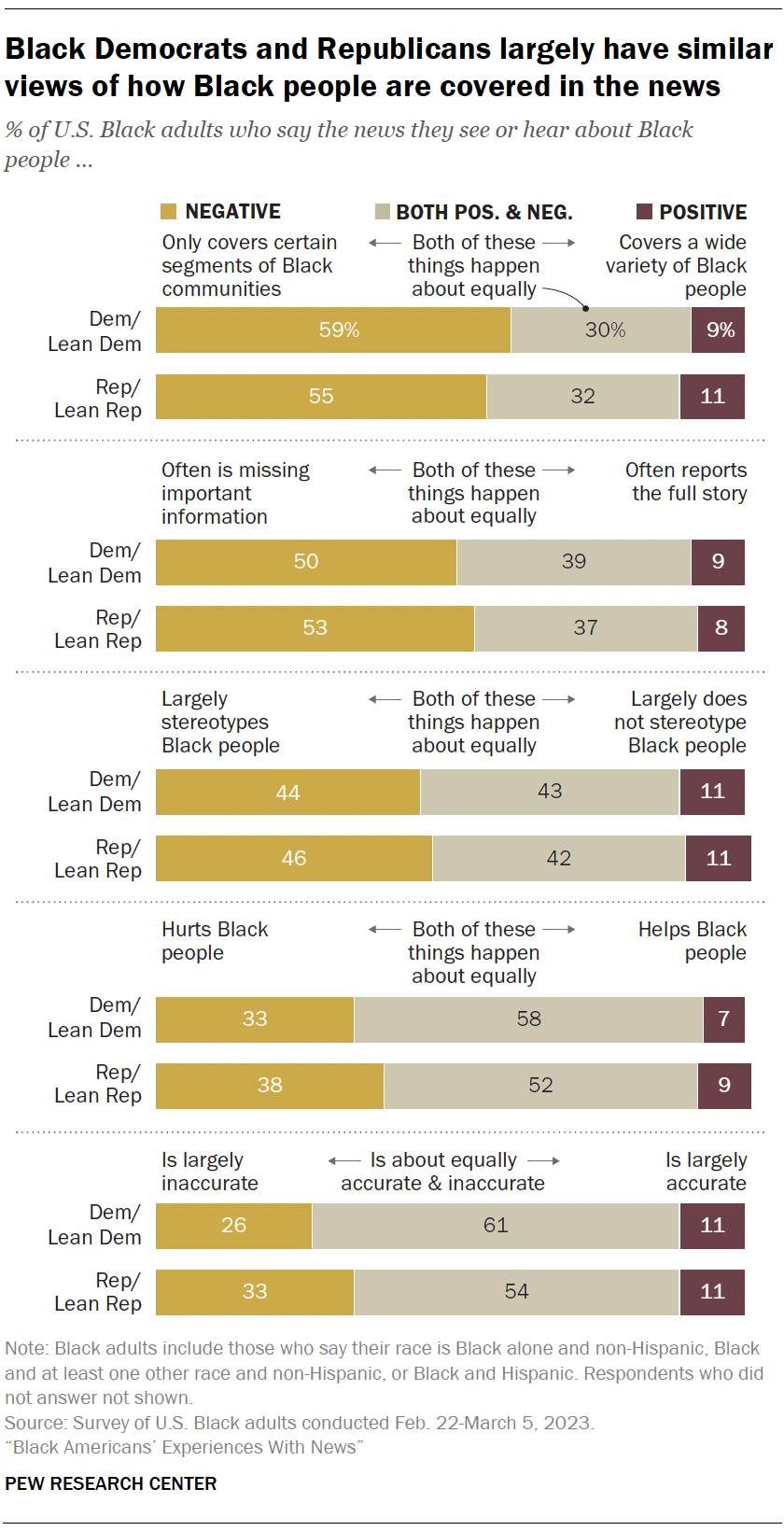
We looked at various groups within the Black population to see how experiences with news and information differ by political party, age, gender, education and income.
Overall, there is a lot of agreement about a range of shortcomings in news coverage of Black people. Men and women, for instance, are virtually in lockstep in these views. Older and younger respondents also largely align in their criticisms.
Compared with the large divides between Republicans and Democrats overall in their views toward the news media – with Republicans tending to be much more skeptical – there are striking similarities between Black Republicans and Black Democrats in their high levels of dissatisfaction in how news outlets cover Black people.
Both groups are consistently much more likely to offer negative, rather than positive, opinions about how Black people are covered in the news:
- 55% of Black Republicans (including independents who lean Republican) and 59% of Black Democrats (and Democratic leaners) say the news they see or hear about Black people only includes certain segments of Black communities, rather than covering a wide variety of Black people.
- Similar shares also say that coverage often is missing important information: 53% of Black Republicans and 50% of Black Democrats express this view.
- 46% of Black Republicans and 44% of Black Democrats agree that coverage largely stereotypes Black people.
- No more than about one-in-ten Black Republicans or Black Democrats choose the positive response for any of these questions.
While Black Democrats are somewhat more likely than Black Republicans to say that news coverage of Black people is often more negative than news about other racial and ethnic groups (66% vs. 54%), both groups are much more negative than positive on this question.
Higher levels of education, income linked with more negative views of coverage
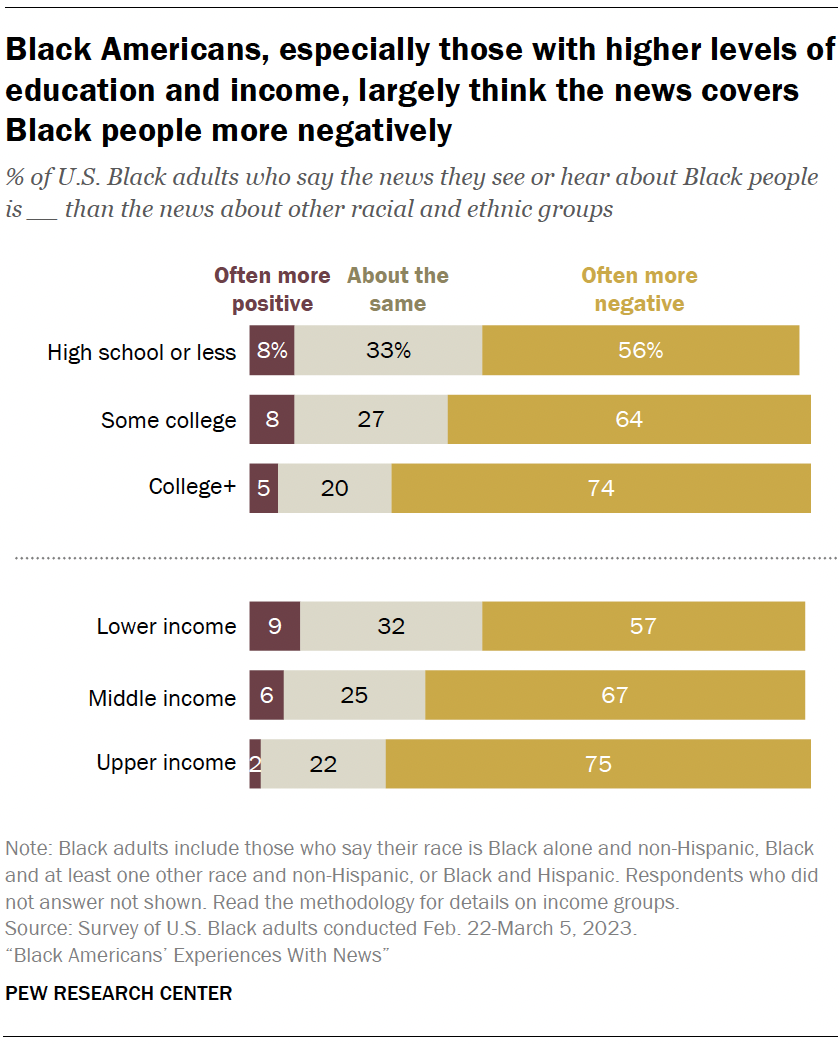
Black Americans across different levels of education and income see problems with the way Black people are covered in the news. But those with higher levels of education and income tend to be especially negative in their assessments.
For instance, about three-quarters of Black adults with at least a bachelor’s degree (74%) say news coverage they see or hear of Black people is more negative than coverage about other racial or ethnic groups, compared with 56% of those who have a high school diploma or less education. A similar gap emerges between the two groups in the shares who say news only covers certain segments of the Black community (68% vs. 49%).
The same pattern exists across income levels. Three-quarters of those in the highest income group say coverage of Black people is often more negative, while 57% in the lowest income group say this. And seven-in-ten of those in the highest income group say news only covers certain segments of Black communities, compared with 52% in the lowest income group (read the methodology for details on income groups.)
Black Americans who say being Black is important to their identity also hold more negative views toward news coverage of Black people than those who say it is less important; details are in Chapter 4.
Reasons why coverage is racially problematic
Overall, a substantial portion of Black Americans say they often come across news about Black people that is racist or racially insensitive. About four-in-ten Black adults (39%) say they extremely or fairly often see this kind of racially problematic news, and an additional 41% say they do so sometimes.
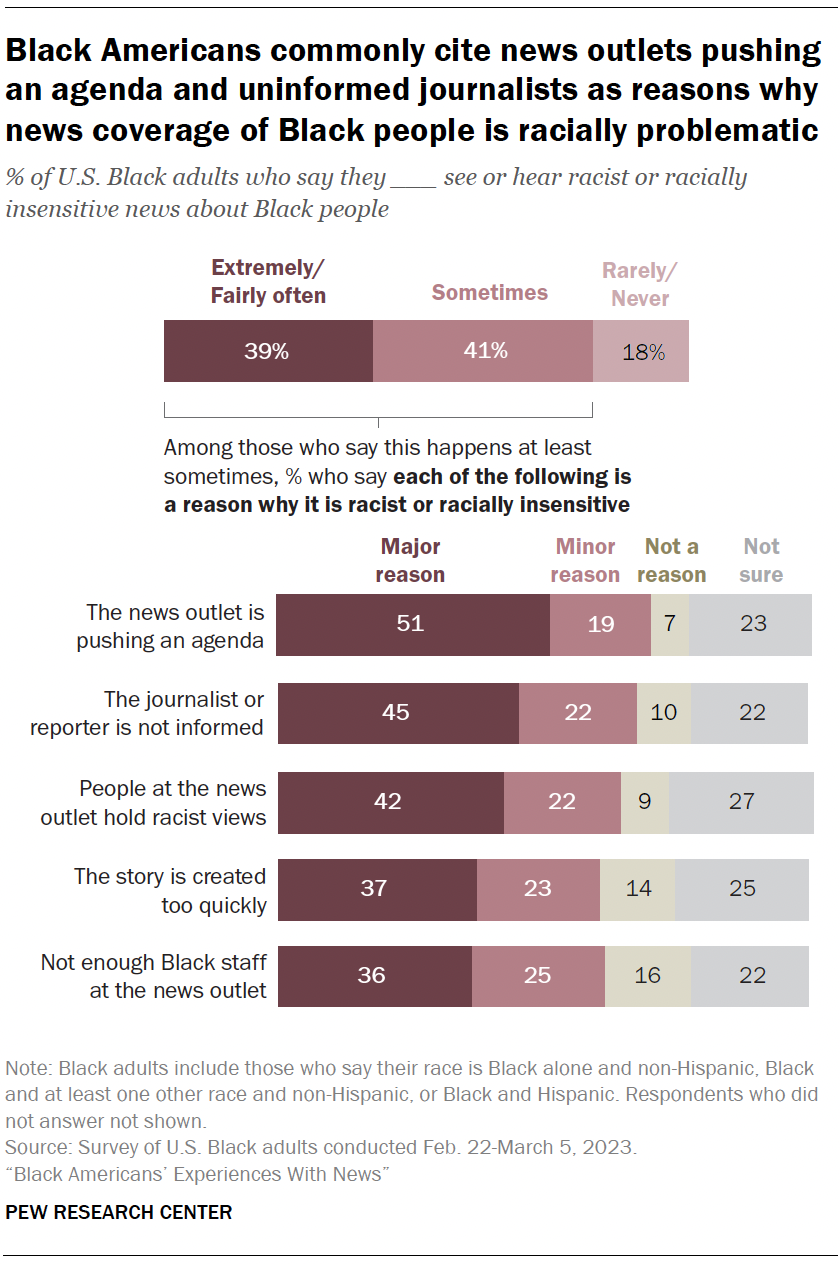
Those who said they at least sometimes come across news about Black people that is racist or racially insensitive also were asked about five potential reasons why that news is racist or racially insensitive.
Within this group, about half (51%) say that news outlets pushing their agendas is a major reason. This is closely followed by 45% who cite journalists and reporters not being informed, and 42% who say people at news outlets holding racist views is a major reason for racist or racially insensitive coverage. Slightly smaller shares see a lack of time put into news stories (37%) or a lack of Black staff (36%) as major factors.
More than half say that each of these issues contributes to the racially problematic coverage either as a major or minor reason, and far fewer say that each is not a reason at all.
Quotes from focus groups on why coverage may be racist or racially insensitive:
“[News outlets want White people] to be scared and fear coming to the Black areas or put money in those areas to build up the businesses to help us out. … They want to look at a Black person and think we’re all bad and think we’re all going to hurt them when that’s not true.” –Black man, 59
“[White people are] the targeted audience so they don’t really want us to know what’s really going on. They’d rather have all the White people think, ‘OK, this is what’s happening, so you guys be aware of what’s really happening.’ But then you have us being like, ‘That’s not what happened. We know exactly what happened.’ The news is biased.” –Black woman, 20
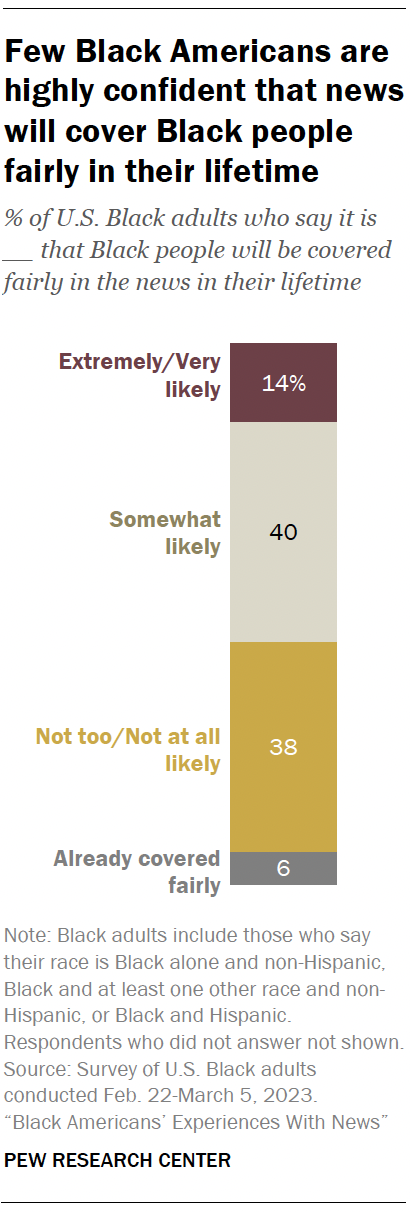
Little confidence that Black people will be covered fairly in the future
With these many criticisms about how Black people are covered in the news, relatively few Black Americans express high levels of optimism that Black people will be covered fairly in the future.
Just 14% say it is extremely or very likely that Black Americans will be covered fairly in the news during their lifetime. A far higher percentage – 38% – are deeply pessimistic about this, saying that it is not too or not at all likely to happen. Another 40% fall somewhere in the middle, saying it is somewhat likely to happen.
Black Americans have expressed similar levels of pessimism about the prospects of achieving equality in the U.S. more broadly in previous Center surveys, with just 13% saying in 2021 that equality for Black people in the U.S. is extremely or very likely.
Even the youngest Black adults are largely skeptical that Black people will be covered fairly in their lifetimes. Very few – 12% – of those ages 65 and older say this is extremely or very likely, as do 17% of Black adults under 30. However, the youngest group is somewhat less inclined to see this prospect as not too or not at all likely to happen (31% vs. 44%).
